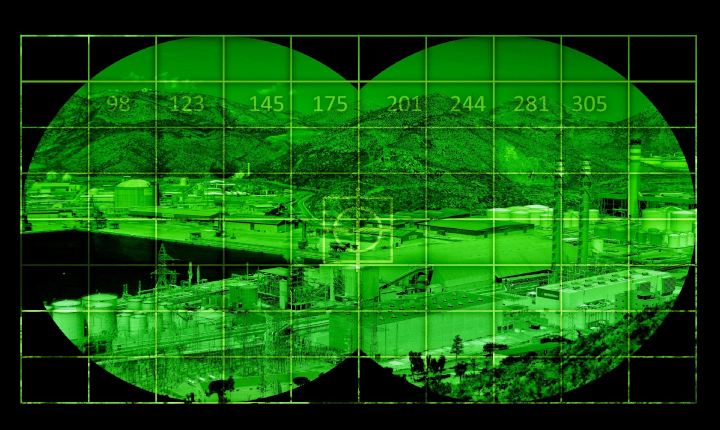

Industrial area near sea - view through night vision
Image intensification is a fundamental and revolutionary technology that lies at the core of night vision optics. It plays an indispensable role in transforming the dark and obscure world of the night into a well-defined, visible, and usable landscape. The importance of image intensification in night vision optics cannot be overstated, as it is the key to unlocking the capabilities of these devices.
Image intensification in night vision amplifies ambient light, converting photons into electrons and multiplying them to create a brighter, visible image. This technology enhances visibility, allows for detailed imaging, and plays a crucial role in night vision optics across various applications, from military operations to wildlife observation and more.
Amplifying existing light
Image intensification technology primarily works by capturing and amplifying existing ambient light, no matter how faint it may be. In low-light or no-light conditions, such as moonlight or starlight, our eyes alone cannot provide sufficient illumination for clear vision. Image intensifiers bridge this gap by converting those scarce photons of light into electrons, which are then multiplied to create a much brighter image.
Enhancing visibility
The amplified image produced by image intensifiers is not only brighter but also visible in a spectrum of green or sometimes white phosphor. This enhanced visibility is invaluable for a wide range of applications, from military and law enforcement operations to surveillance, search and rescue missions, and recreational activities like hunting.
Detailed imaging
Image intensification doesn’t just make objects visible; it also allows for detailed imaging. Modern night vision optics equipped with image intensification technology offer excellent image clarity and resolution, providing users with the ability to discern objects, terrain features, and even human or animal movements in the dark. This level of detail is crucial for making informed decisions and accurate assessments in various scenarios.
Wide range of applications
Image intensification technology is versatile, making it suitable for a wide array of applications. Whether it’s identifying threats in military combat, conducting covert operations, observing wildlife behavior, or navigating in unfamiliar terrain, image intensification plays a pivotal role in enhancing situational awareness and safety.
Real-time monitoring
One of the key advantages of image intensification is its ability to provide real-time monitoring of dynamic scenes. This is especially critical in tactical situations, where split-second decisions can make a difference between success and failure. The rapid response and real-time imaging capabilities offered by image intensifiers are invaluable for maintaining the upper hand in these situations.
Compact and portable
Image intensification technology has advanced to the point where it can be incorporated into compact and portable devices, including night vision goggles, binoculars, and weapon sights. This portability allows users to carry the advantages of image intensification wherever they go, ensuring they are prepared for low-light or night-time conditions.
To sum up
Image intensification is the backbone of night vision optics, providing the critical ability to amplify and enhance available ambient light. Image intensification continues to evolve, pushing the boundaries of night vision capabilities and ensuring that users can operate safely and effectively in challenging low-light conditions.
The way we consume entertainment has changed dramatically, with Subscription Video on Demand (SVOD) leading…
The Evolution of Inventory Tracking RFID inventory management software is transforming how businesses track, manage,…
The Unexpected Costs of Unprotected Windshields Polaris Ranger windshields protection is more than just a…
Probably one of the best things people do to secure their finances is the purchase…
The iPhone 15 is still a great buy Released in 2023, the iPhone 15 brought…
By Josh Breaker-Rolfe Data security posture management (DSPM) is the rising star of the data…